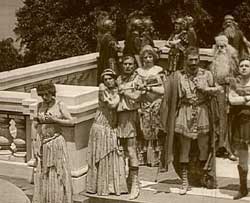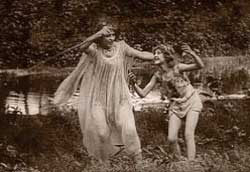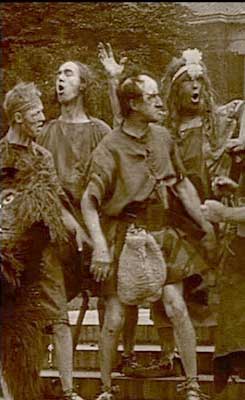 Hermia (Rose Tapley) & Lysander (Maurice Costello) decide to elope when the Duke of Athens attempts to force Hermia to marry Demetrius. Demetrius (Walter Ackerman) pursues the lovers, while Helena (Julia Swayne Gordon) pursues Demetrius whom she loves.
Hermia (Rose Tapley) & Lysander (Maurice Costello) decide to elope when the Duke of Athens attempts to force Hermia to marry Demetrius. Demetrius (Walter Ackerman) pursues the lovers, while Helena (Julia Swayne Gordon) pursues Demetrius whom she loves.
Beautiful costumes, & well chosen outdoor sets, don't quite convey the story of A Midsummer Night's Dream (1909) on their own; but a passing knowledge of Shakespeare & the text cards maks it comprehensible. It's certainly very pretty to watch for eleven & a half minutes.
In the village, peasants are rehearsing a play for the duke of Athens' wedding to Hippolyta (Elita Proctor Otis). This charming sequence of badly groomed, unfortunately dressed peasants hopping & practicing their mummery is amusing, & harkens back to J. Stuart Blackton's own performance when he starred in the Happy Hooligan kinescopic films.
 The peasant scene gets fairly long play considering the brevity of the film overall, as Blackton obviously loved this sort of performance. The peasant scene gets fairly long play considering the brevity of the film overall, as Blackton obviously loved this sort of performance.
And while Shakespeare condensed into scant minutes can't be much of a version of Shakespeare, the way directors Blackton & Kent comingle Shakespeare with Vaudeville is marvelous in itself.
Elsewhere, Titania (Florence Turner) the queen of the fairies is having a disagreement with Penelope (Clara Kimball Young). Penelope starts some magical events in play hoping to get one over on Titania. A love-spell is placed on sleeping Lysander, who falls insanely in love with Helena, the first person he sees upon awaking. He has forgotten his love of Hermia.
Here again the visual treatment is hardly Shakespeare, the scenes being played for the sake of wonderful if primitive special FX concocted by Blackton from his own sheer joy of filmic trickery. This is truly a film that speaks in the language of silent cinema, not the stage, but carries also some of the glamour of even older Victorian fairy illustration.
 Obedient to Penelope's whim, Puck (Gladys Hulette) has also put the love-spell on the eyes of sleeping Queen Titania. The first person she sees when she awakens is the weaver (William V. Ranous, still practicing the peasant play). Obedient to Penelope's whim, Puck (Gladys Hulette) has also put the love-spell on the eyes of sleeping Queen Titania. The first person she sees when she awakens is the weaver (William V. Ranous, still practicing the peasant play).
Puck has placed a spell upon the weaver, giving him the head of a donkey. Titania doesn't care that he's a peasant or an ass, she just loves him at first glimpse.
The mischief of Penelope & Puck has brought them laughter, but Penelope is not brutish at heart, & after one night restores all to normal, & is embraced by Titania for transforming her anger into humor. In the end, all lovers are properly united & the peasants have a new chapter for their planned marriage mummery.
This film was an enormous success in the Christmas season of 1909, & easy to see why it was so. Even today it can charm child & adult alike, & in its time it must've been just about the most exciting fantasy film imaginable.
copyright © by Paghat the Ratgirl
|

